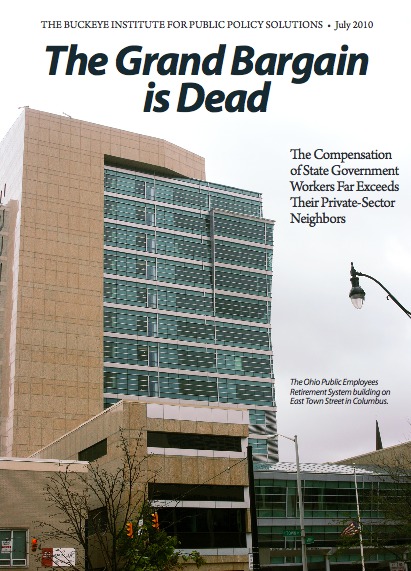The Compensation of State Government Workers Far Exceeds Their Private Sector Neighbors.
Why This Report Matters to You
By Matt A. Mayer
Ohio is facing an estimated $8 billion budget deficit for fiscal years 2012-2013. As our State of the State report found, state government workers today are paid much more than their private-sector neighbors in 85 out of 88 counties. With this comprehensive report comparing the median state government worker and her private-sector peer, it is clear no matter how you slice it that the total compensation package for state government workers far exceeds their private-sector neighbors, despite the single worst decade since the 1830s for investors and an economy in shambles.
This enormous compensation imbalance cannot be maintained, as it is placing too great a burden on the backs of Ohio taxpayers. Whether your ideological views come from the left or the right, it is an undeniable fact that a vibrant government that provides needed services to vulnerable populations and provides other necessary services cannot be maintained without a vibrant private sector that is creating jobs and prosperity from which tax revenues can be derived.
The problems facing Ohio today largely came about because our government grew beyond the revenues generated by a systemically weak private sector. As Ohio government grew by over 93,000 employees over the last twenty years, Ohio’s private sector netted a mere 120,000 jobs from January 1990 to May 2010, or just 492 net jobs per month for Ohio’s 11.4 million citizens.
The core problem is not just that Ohio added almost one new government job for every net private-sector job, it is also that the compensation packages of government workers have grown increasingly more lucrative and disconnected from the economic reality of the vast majority of Ohioans who do not work for government. Simply realigning state government worker compensation packages to match those of their private-sector peers would save taxpayers over $2.3 billion in the next two years, which is nearly 30 percent of the $8 billion budget deficit we need to eliminate.
If state government worker compensation packages are not touched as part of any budget deficit compromise, there is simply no way to balance Ohio’s budget without substantially raising your taxes. We think you have suffered enough and it is high time government workers—largely immune from the impacts of the recession—share the burden of getting Ohio back on its fiscal feet.
To read the rest of the report by Matthew Marlin, Ph.D., Jonathon Scott, and Kaitlyn Wolf, click here: The Grand Bargain is Dead

